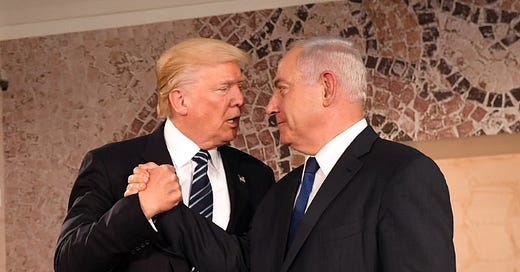Donald Trump thinks he knows what’s best for “the Jewish people.”
In a rally in North Carolina on Wednesday, he told his supporters that Vice President Kamala Harris was “running away from Israel,” because she did not attend the speech before a joint-session of Congress by Israeli Prime Minister Benjamin Netanyahu. Trump, as reported by The Daily Beast, said she was “totally against the Jewish people” and that Jews were being “treated so disrespectfully and badly” by the Democrats, but still prepared to vote for them.
In the past, he has called Jews who vote for Democrats “disloyal to Israel.”
His attack on Harris has been met by befuddlement by liberals, who are missing the forest for the trees, focusing on Harris’ Jewish husband Douglas Emhoff to defend her, when liberals should be pointing out the antisemitic nature of his attacks.
Jews, in Trump’s worldview (and despite his daughter having converted), are a monolith. Our loyalty is and should be to Israel and any Jew who disagrees is being disloyal to Jewish interests.
“I have done more for the Jewish people than any president,” he regularly says. “Jews who do not support Israel” (or are even critical), are disloyal to their kind, he says. He tells Jewish groups that, of course, they are good at business and negotiations. He loves “the Jews,” he will say, as he trots out daughter Ivanka and so-in-law Jared Kushner as proof.
He frames this as praise, but his praise is soaked in the historical stereotypes that have long followed us. Jews are puppet masters — a la the Rothschilds and now George Soros — who control the economy and a shadowy world government. Jews are disloyal, or have split loyalties — the dual-loyalty trope that dogs most immigrant groups. Jews are shylocks — untrustworthy in business, shrewd, sharp, and dangerous.
Trump’s criticism of Harris — and Democratic Jews — falls into the category of philosemitim, which is “broadly conceived as positive discourse on Jews, but that is just the photonegative of the uglier strains of antisemitism that have endangered Jews across the centuries. ” Philosemitism (also known as “Judophilia”), often will “recycle antisemitic themes, recreate Jewish otherness, or strategically compensate for Holocaust guilt,” writes G. Daniel Cohen. The tropes and stereotypes are the same, but used for different purposes.
Cohen, in his paper “Good Jews: Philosemitism in Post-Holocaust Europe,” writes that “the few historians who have explored the issue of ‘philosemitism’ after 1945 have dismissed the phenomenon as a ‘code’ that flirted dangerously with the taboo of antisemitism” or “cautioned against confusing ‘anti-antisemitism’ (the general reprobation of antisemitism after 1945) with an appreciation of Jews or Jewishness.”
For Trump and his supporters, their new “anti-antisemitism” is a tool. They may believe what they say about defending Jews, but their real goal is the defenestration of dissent and the undermining of solidarity among anti- and non-Zionist Jews and Palestinians as Netanyahu continues to wage an unjust and genocidal war in Gaza.
Cohen points to the xenophobic turn in Europe — and the United States, I’d add — in the immediate aftermath of the Sept. 11 attacks, which gained “greater vigour since the refugee crisis beginning in 2015,” as a marker in the current efforts. The Hamas attack on Israel on Oct. 7 only accelerated this further, as protests by pro-Palestine groups led to accusations of antisemitism against protesters by mainstream and conservative Jewish groups. In Europe, Cohen writes, the “’philosemitism’ turned towards xenophobic, populist, and/ or far-right politics” that attempted to bring Jews into “a common ‘Judeo-Christian’ alliance against Islam.” A similar turn has been taking place here, with Trump — and politicians like U.S. Reps. Virginia Foxx (R-N.C.) and Elise Stefanie (R-N.Y.) — denouncing critics of Israel as antisemitic.
This turn, of course, obscures the recent history of a movement that demonizes the Jewish businessman George Soros in terms that could be taken straight from “The Protocols of the Learned Elders of Zion.” Soros has been accused of funding all things anti-Trump and paying for an “invasion” of immigrants at the southern border, as Trump and allies like Tucker Carlson and newly anointed Republican Vice Presidential candidate J.D. Vance, the Republican Senator from Ohio, accuse “liberals” of engaging in a “great replacement” of White voters.
This is the thinking that underpins so much of the suddenly “pro-Jew” Republican Party, which made a show of opposing antisemitism during their convention, and are using Israel as a wedge issue to try and pry Jews away from the Democrats. American Jews are largely supportive of Israel, but most include it in a bigger bucket of issues that also include abortion, climate change, immigration (as opposed to border security), the economy, the social safety net, and so on, and many are turned off by Netanyahu’s corruption and embrace of the far right. There also are Jews like me who condemn what Israel is doing and has been doing in the Occupied territories, who are critical of Harris and President Joe Biden’s efforts during the current version of the war, but who will vote Democrat to prevent Trump and his cult of personality from regaining the White House.
The Jewish community — in the United States, in Europe, even in Israel —contains multitudes, to paraphrase Whitman. But Trumpist right does not see that, cannot see that. To Trump and many of his supporters, we are a monolith, and he is the one who knows what is best for us.




